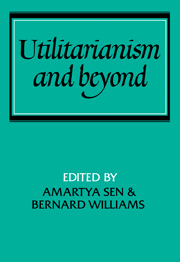Book contents
- Frontmatter
- Contents
- Preface
- Introduction: Utilitarianism and beyond
- 1 Ethical theory and utilitarianism
- 2 Morality and the theory of rational behaviour
- 3 The economic uses of utilitarianism
- 4 Utilitarianism, uncertainty and information
- 5 Contractualism and utilitarianism
- 6 The diversity of goods
- 7 Morality and convention
- 8 Social unity and primary goods
- 9 On some difficulties of the utilitarian economist
- 10 Utilitarianism, information and rights
- 11 Sour grapes – utilitarianism and the genesis of wants
- 12 Liberty and welfare
- 13 Under which descriptions?
- 14 What's the use of going to school?
- Bibliography
7 - Morality and convention
Published online by Cambridge University Press: 30 January 2010
- Frontmatter
- Contents
- Preface
- Introduction: Utilitarianism and beyond
- 1 Ethical theory and utilitarianism
- 2 Morality and the theory of rational behaviour
- 3 The economic uses of utilitarianism
- 4 Utilitarianism, uncertainty and information
- 5 Contractualism and utilitarianism
- 6 The diversity of goods
- 7 Morality and convention
- 8 Social unity and primary goods
- 9 On some difficulties of the utilitarian economist
- 10 Utilitarianism, information and rights
- 11 Sour grapes – utilitarianism and the genesis of wants
- 12 Liberty and welfare
- 13 Under which descriptions?
- 14 What's the use of going to school?
- Bibliography
Summary
1. The philosophical dispute about the objectivity of morals has been four, or more, disputes rolled into one. First, there is the argument about predicates standing for moral qualities: are they to be construed as instrinsic qualities of actions or situations? Secondly, there is the quite different dispute as to whether to attribute a moral quality to a person or to an action is properly to be taken as describing that person or action, or to be taken as another kind of performance, e.g. as expressing an attitude, or as recommending conduct, or both. Thirdly, there is the question of whether two persons expressing disagreement about the answer to a moral problem are properly described as contradicting each other, which is usually interpreted as a question about the conditions of applicability of ‘true’ and ‘false’ to moral judgements. Fourthly, there is the related, but different, question of whether there is a respectable procedure, recognised in other contexts, for establishing the acceptability of moral judgements of various kinds, or whether moral judgement is in this respect suigeneris and for this reason problematic.
These four are some, certainly not all, of the clearly distinguishable questions that are to be found in the literature.
- Type
- Chapter
- Information
- Utilitarianism and Beyond , pp. 145 - 158Publisher: Cambridge University PressPrint publication year: 1982
- 1
- Cited by



